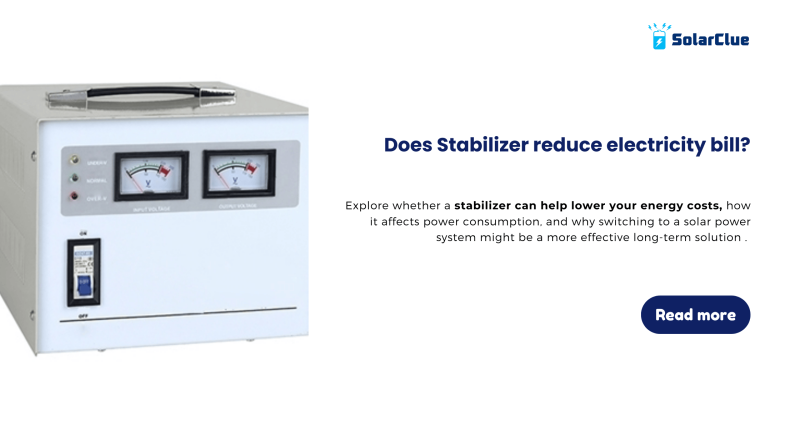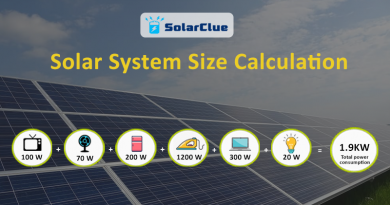Does Stabilizer reduce electricity bill?
A voltage stabilizer is often used to protect appliances from voltage fluctuations, which are common in areas with unstable power supply. While a stabilizer helps maintain a consistent voltage level and protects your appliances from damage, there’s often confusion about whether it can reduce your electricity bill.
In this blog, we’ll explore whether a stabilizer can help lower your energy costs, how it affects power consumption, and why switching to a solar power system might be a more effective long-term solution for significantly reducing your electricity bills.
Table of Contents
- 1 Does a Stabilizer Help Reduce Electricity Bills?
- 1.1 1. Stabilizer’s Primary Function
- 1.2 How Voltage Fluctuations Can Affect Your Bill
- 1.3 Stabilizer vs. Solar Power for Reducing Electricity Bills
- 1.4 Comparison of Stabilizer and Solar Power for Reducing Electricity Bills
- 1.5 How Solar Power Can Help You Save on Energy Costs
- 1.6 Why Choose SolarClue for Your Solar Power Needs?
- 1.7 Switch to Solar Power with SolarClue Today!
Does a Stabilizer Help Reduce Electricity Bills?
1. Stabilizer’s Primary Function
A voltage stabilizer is designed to regulate the voltage coming into your appliances, ensuring that they receive a consistent voltage supply, regardless of fluctuations in the grid. This helps protect your devices, especially sensitive electronics like air conditioners, refrigerators, and TVs, from damage due to overvoltage or undervoltage.
2. Impact on Power Consumption
While a stabilizer helps protect your appliances, it does not directly reduce your electricity consumption. In fact, stabilizers consume a small amount of electricity themselves to perform their function. However, this energy consumption is minimal and will not significantly increase your electricity bill.
3. Can Stabilizers Prevent Energy Wastage?
In cases where voltage fluctuations cause appliances to run inefficiently (for example, air conditioners working harder during low voltage), a stabilizer may help reduce energy wastage by ensuring that appliances operate at their optimal voltage. However, this does not translate to a significant reduction in your electricity bill—it simply ensures that your appliances work more efficiently and are protected from voltage-related issues.
How Voltage Fluctuations Can Affect Your Bill
In areas with frequent voltage fluctuations, appliances may have to work harder to perform their functions, which can lead to higher power consumption. For example, if your air conditioner or refrigerator is running on low voltage, it may draw more current to compensate, increasing energy usage. In this case, a stabilizer can prevent this excessive current draw, thus indirectly helping to manage electricity consumption.
However, the effect of a stabilizer on your overall bill is minor compared to other energy-saving measures.
Stabilizer vs. Solar Power for Reducing Electricity Bills
While a stabilizer helps protect your appliances and ensures they run efficiently during voltage fluctuations, switching to solar power offers a much more effective solution for reducing your electricity bills over the long term.
Here’s why solar power is a better option for saving on electricity costs:
1. Significant Reduction in Electricity Bills
Solar power allows you to generate your own electricity from sunlight, reducing or even eliminating your dependence on grid electricity. With a well-sized solar power system, you can lower your electricity bill by 50-90%.
2. Long-Term Financial Savings
While a stabilizer helps appliances function efficiently, it doesn’t offer long-term financial savings like a solar power system does. Solar power systems typically pay for themselves in 4-7 years, after which you enjoy free electricity for the remaining life of the system, which is usually 25 years or more.
3. Protection from Tariff Increases
Electricity tariffs rise over time due to inflation, increased fuel costs, and demand. Solar power shields you from these rising costs by allowing you to produce your own energy at a stable cost.
4. Environmentally Friendly Energy
Unlike stabilizers, which only manage electricity more efficiently, solar power is a clean, renewable energy source. By switching to solar, you reduce your carbon footprint and contribute to a more sustainable environment.
Comparison of Stabilizer and Solar Power for Reducing Electricity Bills
| Factors | Voltage Stabilizer | Solar Power System |
|---|---|---|
| Primary Function | Protects appliances from voltage fluctuations | Generates clean, renewable electricity |
| Impact on Electricity Bill | Minimal, helps appliances run efficiently | Significantly reduces or eliminates electricity bills |
| Energy Source | Uses grid electricity | Renewable (sunlight) |
| Cost Savings Over Time | Low impact on cost savings | High savings, ROI within 4-7 years |
| Protection from Tariff Hikes | None | Insulates from rising electricity costs |
| Environmental Impact | Neutral | Positive, reduces carbon footprint |
| Return on Investment | No direct financial return | Payback in 4-7 years, then free electricity |
How Solar Power Can Help You Save on Energy Costs
Switching to a solar power system offers a long-term solution for significantly reducing your electricity bills. Here’s why solar power is an ideal energy-saving strategy:
1. Generate Your Own Electricity
Solar panels capture sunlight and convert it into electricity, allowing you to power your home or business without relying on grid electricity. This drastically reduces your monthly electricity bill and provides energy independence.
2. Reduce Your Carbon Footprint
Solar power is a clean, renewable energy source that produces no emissions. By using solar energy, you can reduce your environmental impact and contribute to the fight against climate change.
3. Financial Incentives and Tax Benefits
In India, there are various government subsidies and incentives available for solar power installations, making the switch to solar more affordable. These financial benefits can help offset the upfront cost and accelerate the payback period.
Why Choose SolarClue for Your Solar Power Needs?
If you’re looking to reduce your electricity bills and make a long-term investment in clean energy, SolarClue is your trusted partner for premium solar power solutions. Here’s why SolarClue is the best choice for your solar energy journey:
1. High-Quality Solar Products
SolarClue offers premium solar panels, inverters, and batteries from leading brands like Tata Power Solar, Luminous, Havells, and Sukam. These products ensure optimal efficiency and durability for years to come.
2. Personalized Solar Solutions
At SolarClue, we understand that every home and business has unique energy needs. We offer personalized consultations to design the most suitable solar power system based on your consumption patterns and budget.
3. Comprehensive End-to-End Service
From consultation and system design to installation and maintenance, SolarClue provides end-to-end service, ensuring a hassle-free transition to solar power.
4. Financial Benefits and Subsidies
SolarClue helps customers access government subsidies, tax incentives, and financing options to make solar power more affordable. These benefits can significantly reduce the upfront cost of switching to solar.
Switch to Solar Power with SolarClue Today!
While a stabilizer may protect your appliances, switching to solar power is the best way to reduce your electricity bills and gain energy independence. With SolarClue, you can enjoy premium solar products, personalized service, and long-term financial savings.
Contact SolarClue today for a free consultation and take the first step toward lowering your energy costs with clean, renewable solar power. Start saving now with SolarClue!
FAQs
1. Does a voltage stabilizer reduce electricity bills?
No, a stabilizer’s primary function is to regulate voltage and protect appliances from voltage fluctuations. It does not significantly reduce electricity consumption.
2. How can solar power help reduce my electricity bill?
Solar power generates electricity from sunlight, reducing your reliance on grid electricity and lowering your monthly bill by up to 90%.
3. Does SolarClue offer financing options for solar systems?
Yes, SolarClue provides flexible financing options and helps customers take advantage of government incentives and subsidies.
4. How long does it take to install a solar power system?
Solar power systems typically take 1-3 days to install, depending on the size and complexity of the system.
5. How long does a solar power system last?
A typical solar power system lasts for 25 years or more, providing long-term savings and energy independence.



